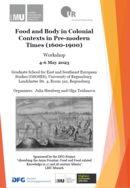Food and Body in Colonial Contexts in Pre-modern Times (1600–1900)
Conveners: Olga Trufanova, Prof. Dr. Julia Herzberg. 4-6 May 2023, Regensburg
04.05.2023 – 06.05.2023
Colonization and exploration of the non-European territories was an inherently bodily experience. Arrival to new lands meant encountering strange climates, nature, and bodies. Those physical differences had to be given a theoretical footing. Food and diet became central arguments to underscore and explain the physical and cultural differences between Europeans and indigenous people, as well as to claim Europeans’ supremacy over the inhabitants of the conquered lands. Indigenous foodways have typically been depicted as inedible, unclean, disgusting, uncivilized and improper for a European body, the maintenance of which became one of the primary imperial concerns. Thus, the physical survival of Europeans on colonial frontiers was tightly intertwined with the preservation of their cultural and religious (most often Christian) identities. Failure to keep colonial difference in place produced concerns about “barbarization”, “going native” and “hybridization” that were believed to endanger colonial regimes and the legitimacy of their claims of physical, cultural and racial supremacy over the colonized bodies.
Notwithstanding the efforts to maintain a dietary distance between newcomers and indigenous people, colonialism inevitably resulted in alteration in diets on both sides. While European foodways were often used as instruments of cultivating untamed lands as well as “civilizing” the manners of its inhabitants, many indigenous plants and recipes were adopted into European diets, opening a path to what subsequently became called the Columbian exchange and colonial food chains. In addition to foodstuffs and products, indigenous knowledge about the nourishing environment has been expropriated and integrated into the European body of knowledge.
Much research has been done on the entanglements of food and colonialism, usually with a focus on Western Empires and their overseas colonies in Americas, Africa and Asia. Those colonized regions with warm tropical or subtropical climates produced associations with Eden, abundance and fertility, while remaining dangerous and challenging for many European bodies. However, less attention has been paid to the meaning of food in colder colonized regions of the world, such as Siberia, Alaska, or Greenland, or to empires such as the Ottoman Empire or the Russian Empire.
The workshop aims to bring into dialogue scholars of colonialism and food focused on different regions of the world. The task is to enable exchange and development of methodologies and concepts of dietary cultural encounters in colonial/frontier settings, as well as to broaden the scope of existing research to incorporate less studied colonial regions.
The workshop is open to the public.
If you have any further inquiries, please send an email to Olga.Trufanova@geschichte.uni-regensburg.de.
Address:
Landshuter Str. 4, Regensburg, Room 319
Graduate School for East and Southeast European Studies (GSOSES)
University of Regensburg
In cooperation with:
Sponsored by:



